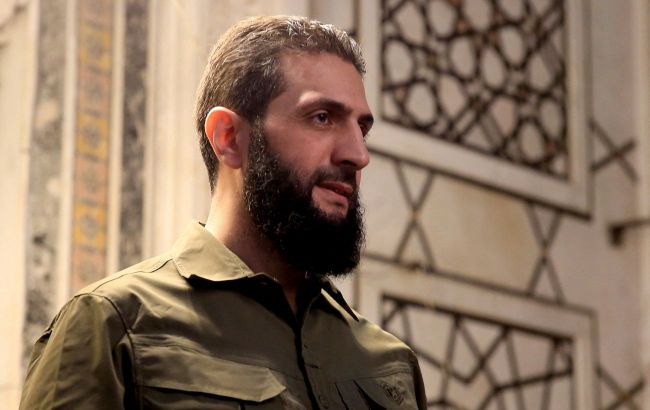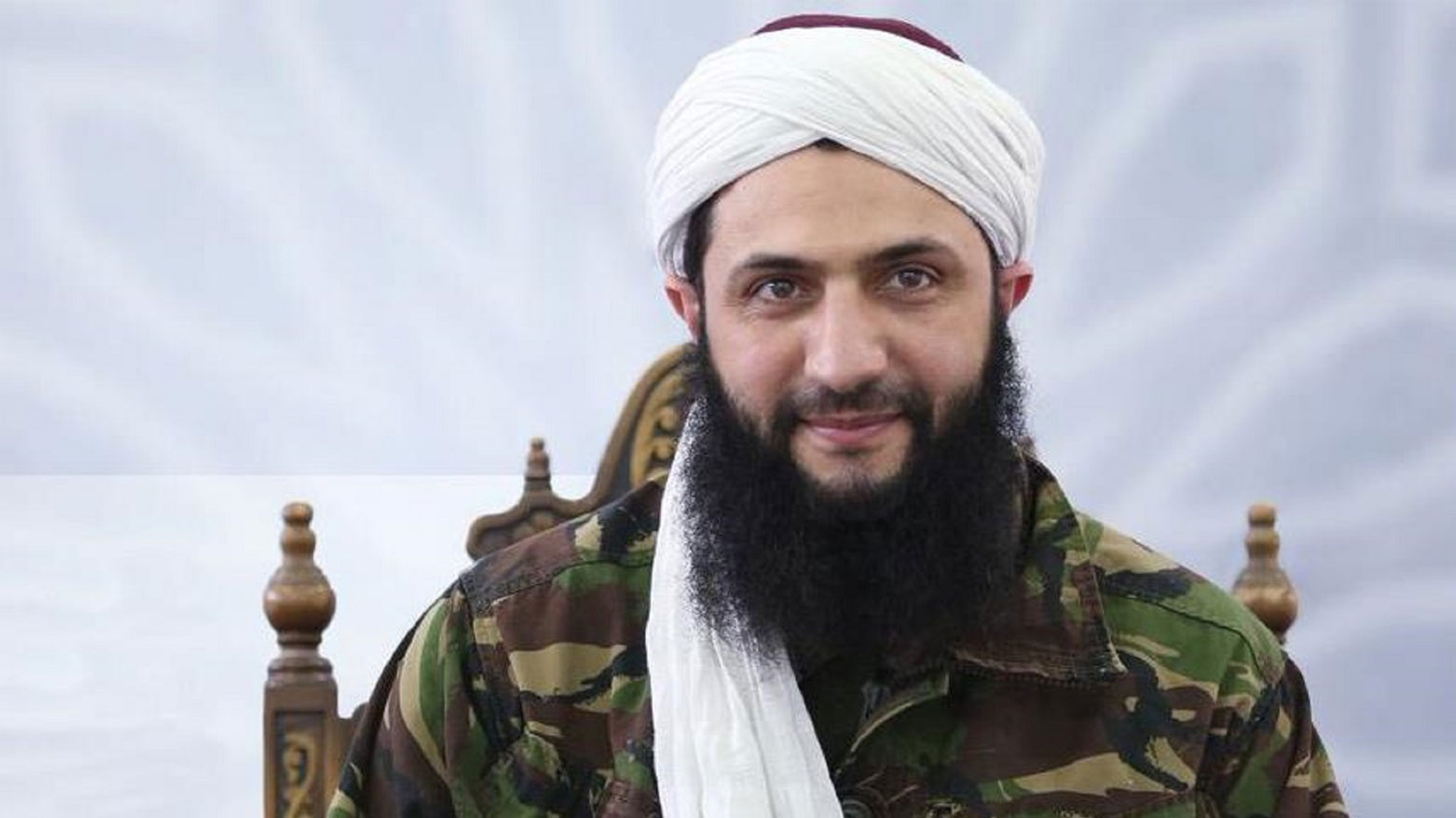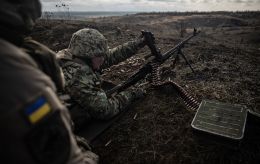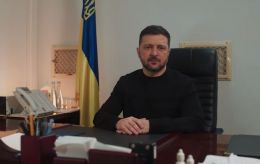Evolution of jihadist: Who is Mohammad al-Julani, the man who overthrew Assad
 Photo: Leader of the Syrian rebels, Abu Mohammad al-Julani (Getty Images)
Photo: Leader of the Syrian rebels, Abu Mohammad al-Julani (Getty Images)
The rapid advance of Syrian rebels and the overthrow of Bashar al-Assad's regime have brought Abu Mohammad al-Julani to the forefront. To achieve his goals, he abandoned the image of a jihadist in favor of more moderate views.
RBC-Ukraine explains who al-Julani is and how he might play a significant role in Syria's future.
Contents
- Iraq and ISIL: Al-Julani's path as a jihadist
- Ties with al-Qaeda and emergence of Hay'at Tahrir al-Sham
- Experience of "statehood" in Syria's Idlib
- New type of leader? How al-Julani positions himself
Once an extremist who fought against US forces in Iraq, Syrian rebel leader Abu Mohammad al-Julani (whose group toppled Bashar al-Assad's regime) now professes support for pluralism and tolerance.
He has abandoned his pseudonym and now uses his real name, Ahmed al-Shara, in official communications. This move is part of efforts to distance himself from his jihadist past and strengthen his legitimacy in a new context, as Hay'at Tahrir al-Sham (HTS) takes control of much of Syria.
His transformation has been cultivated over the years, evident not only in his public statements but also in his appearance. In recent years, he swapped traditional Islamist clothing for a shirt and trousers, and now dons a military uniform to emphasize his status as a military commander. He is now predicted to play a significant role in Syria's future government, but many wonder whether he can unite the country after 13 years of civil war.
Iraq and ISIL: Al-Julani’s path as a jihadist
Al-Julani was born in 1982 in Saudi Arabia, where his father worked as a petroleum engineer. His middle-class family, displaced from the Israeli-occupied Golan Heights, returned to Syria in 1989.
His political views were shaped by the Palestinian Intifada of 2000 and the September 11, 2001 attacks. His path as a jihadist began a few years later when he joined other foreign fighters in Iraq to combat US forces and established ties with al-Qaeda.
Later, al-Julani was detained by US forces and spent time in the infamous Abu Ghraib prison, where he met Abu Bakr al-Baghdadi, who later became the leader of the terrorist organization Islamic State.
The popular uprising in Syria in 2011 was brutally suppressed by Assad’s regime, leading to a prolonged civil war. At that time, al-Julani returned to Syria with the mission of creating the covert group Jabhat al-Nusra ("Front for the Conquest of the Levant"). The group quickly became a prominent Syrian fighting force, despite concealing its ties to ISIL and al-Qaeda.

Photo: al-Julani started as one of the leaders of the jihadists (video screenshot)
Tensions arose among the leaders in 2013 when al-Baghdadi in Iraq unilaterally announced the merger of several groups into the Islamic State of Iraq and the Levant (ISIL) and publicly revealed their connection for the first time. Al-Julani sought to distance himself from its violent tactics, leading to a split.
To navigate this situation, he pledged allegiance to al-Qaeda, making Jabhat al-Nusra its Syrian branch. From the start, he prioritized toppling Bashar al-Assad's regime and adopted a more pragmatic stance than other radical Islamists.
Ties with al-Qaeda and emergence of Hay'at Tahrir al-Sham
Affiliation with al-Qaeda brought al-Julani into conflict with the Islamic State. While his actions were partially aimed at retaining the support of Syrian and rebel factions, ties with al-Qaeda ultimately undermined this effort.
This became a significant issue when Jabhat al-Nusra and other groups seized control of Idlib Province but could not agree on governing the territory.
In his first interview in 2014, al-Julani declared his goal to establish Islamic law in Syria. He made it clear that there was no place for minorities such as Alawites, Shias, Druze, and Christians.
As a result, in 2016, al-Julani severed ties with al-Qaeda, rebranding his group as Jabhat Fath al-Sham, later renamed Hay'at Tahrir al-Sham (HTS, "Organization for the Liberation of the Levant").
Initially, the split appeared superficial but revealed deeper divisions. Al-Qaeda accused him of betrayal and subsequently formed a new affiliate in Syria, which HTS militants crushed in 2020.
Simultaneously, HTS targeted ISIL terrorists and foreign fighters in Idlib, dismantling their networks and forcing some into "deradicalization" programs. These steps, justified as unifying efforts, signaled Al-Jawlani's strategy to transform HTS into a politically viable force.
Despite the public split with jihadists and the name change, HTS remained designated as a terrorist organization in many countries. The US government offered a $10 million reward for information on al-Julani's whereabouts.
Experience of "statehood" in Syria's Idlib
Under al-Julani’s leadership, HTS became the dominant force in Idlib, the largest rebel stronghold in northwest Syria. A so-called "Syrian Salvation Government" was established to manage the province, functioning as a de facto state with a prime minister, ministries, and local departments while maintaining a Sharia council for governance.
Although he abandoned some principles of Islamic law, al-Julani later advocated for religious tolerance. "We don’t want society to become hypocritical, praying when they see us and not praying when we leave," he said.

Photo: Al-Julani in Syria's Idlib has already positioned himself as a proponent of moderate views (x.com/amjadmedia)
In Idlib, al-Julani began presenting himself as a proponent of moderate views. For his first appearance before a Western audience, he wore a blazer and had his hair neatly combed back. Al-Julani asserted that his group did not pose a threat to the West and called sanctions unjust.
"Yes, we criticized Western policies. But waging war against the United States or Europe while in Syria is not true. We never said we wanted to fight," he stated in a 2021 interview.
To distance himself from the jihadist image, al-Julani engaged with the public, visiting refugee camps and overseeing aid for earthquake victims in 2023. He also cited the Taliban’s return to power in Afghanistan as a model for balancing tactical compromises to achieve strategic goals.
His policies reflected a broader strategy to demonstrate HTS’s ability not only to wage jihad but also to govern effectively. Prioritizing stability and recovery, he sought to present Idlib’s achievements as a model of success, boosting HTS’s legitimacy and advancing his political ambitions.
Under his leadership, HTS defeated other jihadist and rebel groups, consolidating power in a single entity. However, before launching a major offensive against Assad's regime in 2024, he faced protests.
Critics accused al-Julani of authoritarianism and suppressing dissent. They also claimed that HTS deliberately avoided combat against government forces and obstructed other jihadists from doing so to appease international players.
In response, several reforms were implemented. HTS restructured its security service, which had been accused of human rights violations, and established a department to handle complaints against authorities. The group argued that unification under its leadership was essential for overthrowing Assad.
Thus, HTS had to balance portraying a modern, moderate image to gain local and international support while retaining its Islamist identity to satisfy hardline supporters.
New type of leader? How al-Julani positions himself
After decades of Assad’s regime, it fell within mere days, largely due to the fighters under al-Julani. On Sunday, he entered Damascus as part of a column of rebels, spoke at the iconic Umayyad Mosque, and declared the "victory for the Islamic nation."
"Our message to all the sects of Syria, is that we tell them that Syria is for everyone," said another high-ranking rebel commander, Anas Salkhadi.
HTS’s success in uniting the opposition and gaining control over nearly the entire country has strengthened al-Julani’s position. He is now working to reassure both domestic and international audiences. To Syrians, he promises security; to neighboring countries, peaceful relations. This shift reflects a strategy of "moderate jihad," prioritizing pragmatism over rigid ideology. A successful campaign in Damascus might even signal the decline of jihadist movements like ISIL and al-Qaeda (although the opposite scenario remains possible).
Currently, the rebel leader sees himself as part of a political resolution in Syria, noted Burcu Ozcelik, a Senior Research Fellow for Middle East Security within the International Security department at RUSI.
"Al-Julani aims to be a key player in Syria. His reliance on a pro-democratic narrative suggests that he is capable of adapting his views. The real test will be whether he is genuinely committed to democratic governance or merely playing with rhetoric," she added.
Without a doubt, the 42-year-old al-Julani is the most influential figure in Syria, explains Jerome Drevon, a senior analyst on Jihad and Modern Conflict at the International Crisis Group (ICG), who has met with him several times over the past five years. Al-Julani's situation can be compared to those of other leaders who gained widespread prominence during military conflicts.
Events in Syria are being closely monitored worldwide. Many observers are trying to determine whether al-Julani has truly abandoned his jihadist past. Some suggest that he could be seen as a pro-democracy leader for Syria. At the very least, as Western media reports, the US and the UK might stop designating HTS as a terrorist organization.
Sources: Sky News, BBC, The Guardian, The New York Times.

